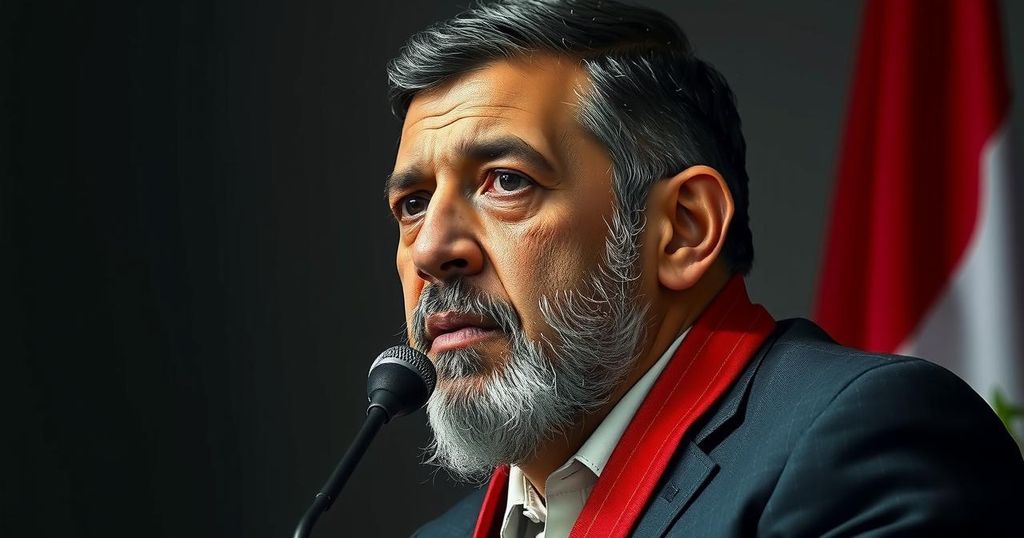Yamandú Orsi Elected President of Uruguay, Promises Unity and Moderate Reform

Yamandú Orsi has claimed victory as Uruguay’s new president, defeating incumbent Álvaro Delgado in a close runoff election. With over 49% of the vote, Orsi promises to unite the nation while advocating for moderate policies to address issues like poverty and crime. His win reflects a trend in Latin America of voters seeking change from incumbent governance amid dissatisfaction with the status quo, with plans for a new leftist approach rooted in previous successful reforms.
On Sunday, Uruguay’s leftist opposition candidate Yamandú Orsi emerged victorious in a closely contested presidential runoff, effectively displacing the conservative governing coalition. His win reflects a wider trend across South America, where voters have increasingly rejected incumbent administrations following a year marked by significant elections. While Álvaro Delgado, the candidate from the ruling center-right coalition, publicly conceded defeat, Orsi celebrated his victory amidst fireworks and cheers from his supporters, pledging to unify the nation amid its divisions.
Orsi, a 57-year-old former history teacher, received just over 49% of the votes, while Delgado garnered around 46%. The high turnout rate of almost 90% illustrates the political engagement of Uruguay’s electorate. Despite differing perceptions among voters, Orsi emphasized the importance of dialogue and cooperation, seeking to bridge the divide between his supporters and those who opposed him in the election.
Unlike numerous populist leaders observed globally, Orsi does not propose radical changes. He champions a moderate agenda that prioritizes reducing child poverty and tackling organized crime, while largely maintaining the market-friendly policies established during the Broad Front’s previous governance from 2005 to 2020. His approach is reminiscent of the administration’s growth-focused policies that earned international acclaim due to significant social reforms.
Specific proposals from Orsi include fiscal incentives to attract investment in the vital agricultural sector and modifications to social security aimed at lowering the retirement age. However, he will likely approach trade dynamics with caution regarding the previously pursued agreement with China, which had been a point of contention under the outgoing administration.
While Delgado, a seasoned political figure, campaigned on the continuity of his predecessor’s policies, the mounting dissatisfaction regarding economic hardships and security issues contributed to his defeat. Orsi, embracing the spirit of inclusivity, communicated his intent to foster unity within the nation. As he prepares for his term beginning March 1, 2025, Orsi recognizes the extensive work that lies ahead for his administration, signaling a transformative yet careful approach to leadership.
With this election outcome, Uruguay reflects a growing trend in South America of voters seeking change amid economic and political challenges. The implications of Orsi’s leadership may provide a new direction for the nation as it confronts pressing social and economic issues.
In recent years, Uruguay has observed significant political shifts, and the recent election of Yamandú Orsi signals a pivotal moment in its governance. The presidential runoff featured a stark contrast between Orsi’s leftist views and the outgoing center-right coalition led by Álvaro Delgado. With a historical backdrop of economic growth and social reforms under past administrations, Orsi’s moderate agenda aims to address contemporary challenges such as poverty and organized crime while maintaining stability and investment in the country. This election is a part of a broader pattern seen in Latin America where voters are disapproving of the status quo and seeking new leadership to tackle long-standing issues. Orsi inherits a complex political landscape as he prepares to lead a nation that has traditionally witnessed fluctuations in its political alignments and economic policies.
Yamandú Orsi’s recent victory in Uruguay’s presidential election serves as a significant development in the political arena of South America. His moderate approach, rooted in addressing vital issues such as child poverty and crime, stands in contrast to the more radical shifts seen elsewhere in the region. As Orsi prepares to lead, his focus on unity and inclusivity will be crucial in fostering collaboration across the political spectrum, enabling him to navigate the pressing challenges facing Uruguay while continuing the legacy of growth and reform established by previous administrations.
Original Source: time.com







